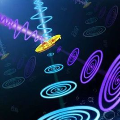We present new results on the landscape of problems that can be solved by quantum Turing machines (QTM's) employing severely limited amounts of memory. In this context, we demonstrate two infinite time hierarchies of complexity classes within the ``small space'' regime: For all $i\geq 0$, there is a language that can be recognized by a constant-space machine in $2^{O(n^{1/2^i})}$ time, but not by any sublogarithmic-space QTM in $2^{O(n^{1/2^{i+1}})}$ time. For quantum machines operating within $o(\log \log n)$ space, there exists another hierarchy, each level of which corresponds to an expected runtime of $2^{O((\log n)^i)}$ for a different positive integer $i$. We also improve a quantum advantage result, demonstrating a language that can be recognized by a polynomial-time constant-space QTM, but not by any classical machine using $o(\log \log n)$ space, regardless of the time budget. The implications of our findings for quantum space-time tradeoffs are discussed.
翻译:暂无翻译



